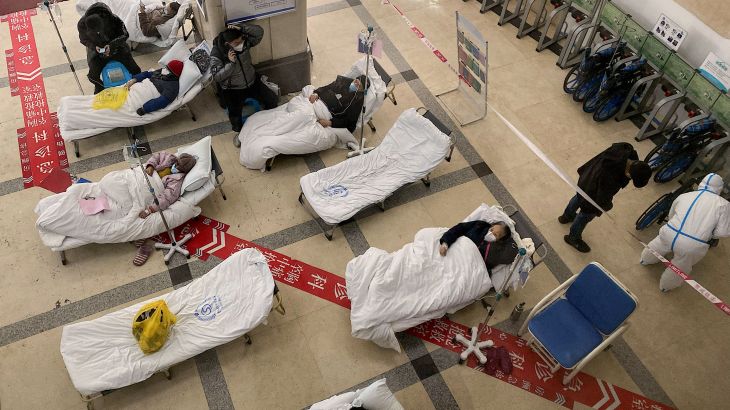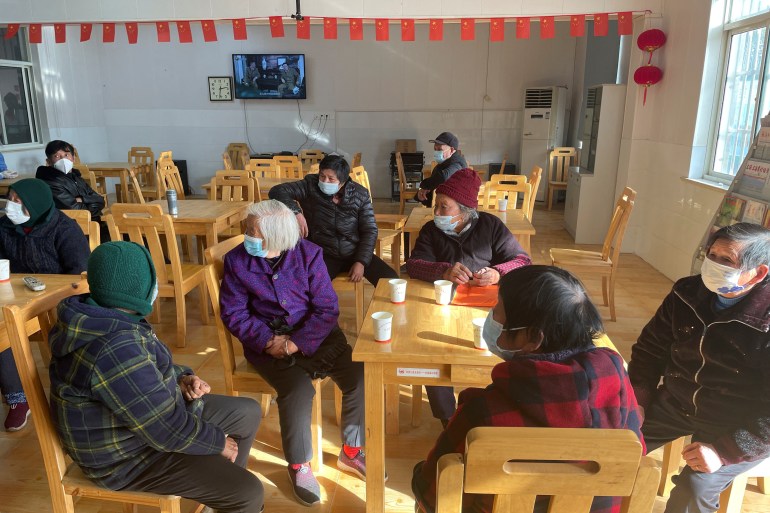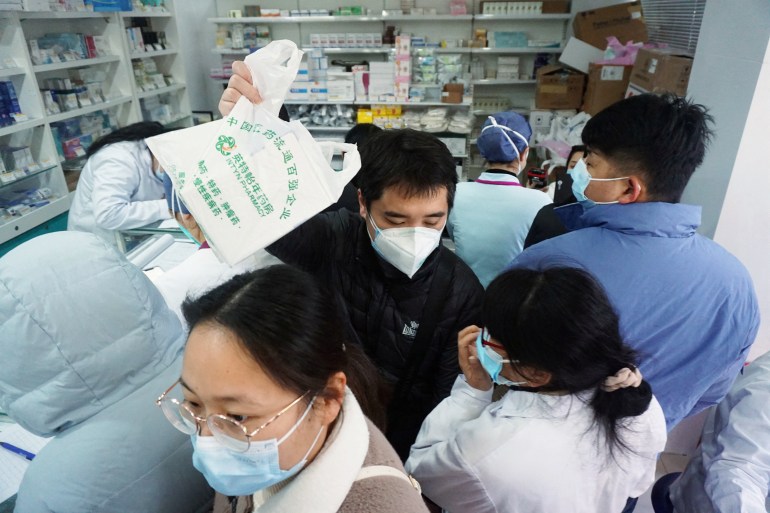Elderly leave cities as COVID infections surge in China
Families tell of sending elderly relatives away from China’s cities amid reports of surging cases and deaths.

Three days ago, Lily Wang tested positive for COVID-19.
Isolating in her small apartment in Shenzhen, the 29-year-old is currently fighting a high fever and a sore throat.
Keep reading
list of 4 itemsChina COVID cases more than double in growing outbreak
China COVID protests die down, but policy resentment remains
Hazmat suit-clad riot police confront China COVID-19 protesters
Despite her own illness, Wang’s thoughts were for her grandmother who has been spared from sickness so far, thanks to the quick actions of her parents.
“My parents got my grandmother out of the city in time,” Wang said over the phone between bouts of coughing.
Two days after dropping her grandmother off with relatives in the countryside, both of Wang’s parents fell sick.
Almost all of Wang’s work colleagues are stricken by COVID too, she adds.
Across China, those who can afford it are getting their elderly relatives out of the major cities to protect them from succumbing to the wave of COVID-19 that is currently battering the country.
“The COVID situation is really bad right now,” 24-year-old Shuwen Lu told Al Jazeera over a WeChat connection from her home in Beijing.
Lu, who is also currently fighting a COVID infection, told how her grandparents were helped out of Beijing to a small village where the family has a house.
“Had they stayed in the city, they might soon have joined the countless elderly people that are dying right now,” Lu said.
Since authorities began lifting China’s strict COVID restrictions in early December, numerous reports have emerged of people falling sick with the virus, hospitals overwhelmed with patients, and the country’s crematoriums struggling to keep up with an influx of bodies arriving at their doors.
It was stories similar to these that prompted the sources who spoke to Al Jazeera to move their older relatives out of built-up areas.
“My family decided that the safest thing to do for my grandparents was to get them out of Beijing so they can ride out the COVID storm in safety away from the crowds,” Lu explained.
In the cities of Fuzhou and Shanghai, sources there also told Al Jazeera of senior family members making for the countryside or smaller village communities to escape the wave of COVID that has emerged since China dropped its zero-COVID policy.
The elderly are vulnerable
The elderly are especially vulnerable to infection from COVID-19 and, according to reports, in China, two-thirds of those aged 80 years and older have been vaccinated, with about 40 percent having received a booster shot going into the current wave of infections.
Lower vaccination rates among the elderly can partly be attributed to the Chinese vaccine strategy at the beginning of the pandemic when vaccines were initially prioritised for essential workers to ensure that the economy would not grind to a halt in case of large outbreaks.

By the time large segments of the elderly population were being vaccinated, authorities had introduced the zero-COVID strategy and its initial success in protecting people slowed the prioritisation for all older people to be vaccinated.
The zero-COVID strategy had for almost three years kept China’s senior citizens safe from serious illness by keeping less contagious COVID variants at bay. The policy protected but it also meant that no immunity was built up among the elderly from previous infections.
Now, with the rapid reopening of Chinese society, the strategy of the last few years has left millions of people poorly protected against severe COVID infection.
Vaccine hesitancy in China – particularly with regard to the question of whether older people should get vaccinated or not – has also contributed to a perfect storm of problems the country is facing.
Lu and Wang both said their grandparents had not been vaccinated against COVID.
“Of course, my grandparents are not vaccinated,” Lu said when asked. “At their advanced age, who knows what might happen if they get a shot,” she said.
Wang’s grandmother has diabetes and several other health problems and thought better of getting the vaccine.
“She is worried, and my family is worried too, that her poor health won’t stand a vaccine. So, why risk it?”
Official numbers versus reality
According to official Chinese accounts, and COVID numbers, there is no cause for concern.
The official narrative is that abandoning the zero-COVID strategy has been just as successful as when the same strategy was an indisputable principle of Chinese governance.
The director of the National Centre for Infectious Diseases, Zhang Wenhong, told local media on Thursday that he visited several nursing homes in Shanghai and the number of elderly dealing with severe symptoms was low. Wenhong said he expected the peak of infections to be reached within a week.
China officially reported 4,128 new symptomatic cases on Friday and no new deaths. In total, according to official figures, there had been just a handful of COVID-related deaths since restrictions were dropped earlier this month.
That story stands in sharp contrast to images shared on social media and reports of the strained crematoriums, overflowing hospitals, the establishment of fever centres – to take the pressure off the hospitals – and the panic-buying of flu medication.
Bloomberg News reported on Friday, citing estimates from China’s top health authority, that nearly 37 million people in China may have been infected with COVID-19 on a single day this week.

Chinese authorities have tended throughout their handling of COVID to give an incomplete picture of the situation in order to place the leadership’s decisions in the best possible light, said Associate Professor Yao-Yuan Yeh, who teaches Chinese Studies at the University of St Thomas in the United States.
“So, in spite of the current chaos, it is very unlikely that we will see the Chinese government admitting to having committed mistakes with the zero-COVID strategy or with the subsequent opening up of society,” Yao-Yuan Yeh said.
“On the contrary, they will highlight the elements that will make their policy appear as a success while downplaying or simply leaving out incidents that point to failure,” he said.
Omitting facts that point to failure could be seen this week when a leading Chinese medical expert announced that only deaths caused by pneumonia and respiratory failure, after contracting COVID, would henceforth be classified as a COVID-19 death.
The change in classification was criticised by disease experts outside China who said that the new classification would lead to a vast undercounting of the true number of COVID fatalities – something the Chinese authorities have been accused of doing ever since the first outbreak in Wuhan in 2019.
“This time around it is, for the authorities, about under-stating the numbers that indicate that the Chinese government has switched from one crisis brought about by the zero-COVID policy to a new crisis brought about by the rapid dismantling of the zero-COVID policy,” Yao-Yuan Yeh said.
In Shenzhen, Wang just hopes that the crises will end soon, so that she can once again experience life without COVID.
“And I hope my grandmother will survive to experience it too,” she said.